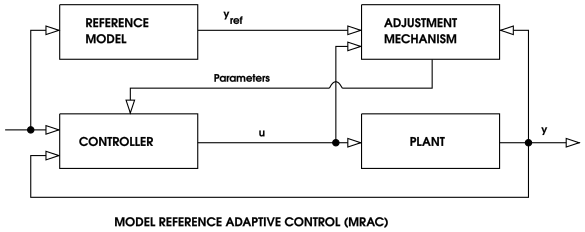Adaptive control
Adaptive control is in the control technology called a scheme that their characteristics can adapt to the process. The complexity of the structure does not increase.
Adaptive control (from adapt = to adapt) is used because normal control can only compensate for relatively small changes in the process dynamics . This is why there is adaptive control for larger, slow changes where a static controller can no longer work satisfactorily. Examples of this are supersonic aircraft, the behavior of which changes greatly with each Mach , as well as unknown or changing delays or disturbances.
Classification
Typical for the process of the adaptation are the identification , which can take place indirectly or directly, and the decision-making process , which changes the adjustable parameters during the process via a modification stage .
The difference between the following adaptive controls is the different realizations of these 3 levels. The adaptive control systems can be divided into 3 basic structures with regard to their mode of operation and their execution principle.
Controlled adaptation with parallel comparison model (p.137)
The behavior of the real process is compared with that of the predefined model. The deviation between the model and the process is fed to the adaptation device. This changes the controller parameters until the deviation is as small as possible.
In addition to this designation ( Unbehauen 1988), the name model reference control (Föllinger 1992) is also used. The English name is model reference adaptive systems (MRAS) or model reference adaptive control (MRAC).

|
Controlled adaptation without a comparison model (pp. 137–138)
Changes in the control loop are recognized by an identification level and the control parameters are adjusted based on a quality criterion . In addition to this designation (Unbehauen 1988), the name self-tuning process (Föllinger 1990 6th edition, p.15) is also in use.

|
Controlled adaptation (parameter scheduling) (p. 138)
"If the behavior of a control system for different parameter changes in the controlled system and disturbances is known, then it is often possible to make the necessary adjustments to the controller parameters via a fixed assignment ." This process involves controlling the control parameters. The effects of the parameter changes on the control process are not considered.
swell
- ↑ a b c d Heinz Unbehauen: Control Engineering III , Vieweg, 2000, 6th edition, ISBN 3528533498
Web links
- Adaptive Control ( Memento from March 19, 2006 in the Internet Archive )
- to MRAC engl.
literature
- KJ Astrom, B. Wittenmark: Adaptive Control . 2nd Edition. Addison-Wesley, 1989.
- Shankar Sastry, Marc Bodson: Adaptive Control: Stability, Convergence, and Robustness . Prentice-Hall, 1994 ( utah.edu [accessed November 18, 2007]).